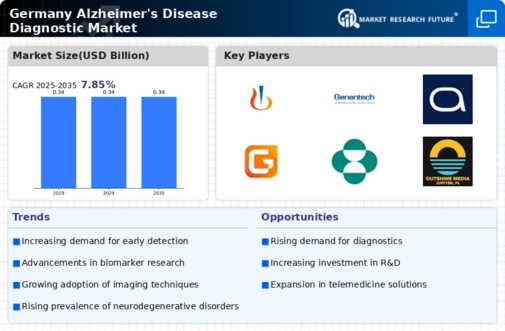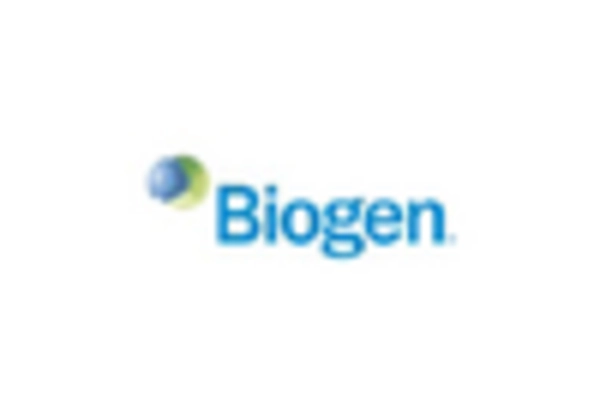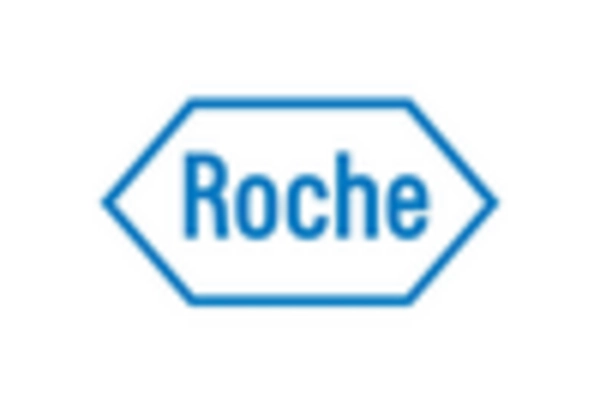Increased Awareness and Education
Raising awareness about Alzheimer's disease and its impact on individuals and families is crucial for the growth of the alzheimers disease-diagnostic market. In Germany, various organizations and advocacy groups are actively promoting education on the disease, its symptoms, and the importance of early diagnosis. This heightened awareness is leading to more individuals seeking diagnostic services, thereby driving market demand. Furthermore, as public understanding of Alzheimer's improves, healthcare providers are more likely to prioritize early detection and intervention, which could further stimulate growth in the alzheimers disease-diagnostic market.
Government Initiatives and Funding
Government initiatives aimed at combating Alzheimer's disease play a vital role in shaping the alzheimers disease-diagnostic market. In Germany, substantial funding has been allocated to research and development of diagnostic tools and treatments. The Federal Ministry of Health has launched various programs to enhance awareness and improve diagnostic capabilities. These initiatives not only support the advancement of technology but also encourage collaboration between public and private sectors. As a result, the alzheimers disease-diagnostic market is poised for growth, with increased investment leading to the introduction of novel diagnostic solutions that can improve patient outcomes.
Growing Demand for Personalized Medicine
The shift towards personalized medicine is influencing the Alzheimer's disease-diagnostic market in Germany. Healthcare professionals are increasingly recognizing the importance of tailoring diagnostic approaches to individual patients. This trend is driven by advancements in genetic testing and biomarker identification, which enable more precise diagnoses. As a result, the demand for diagnostic tools that can provide personalized insights into Alzheimer's disease is on the rise. This evolution in patient care is likely to foster innovation within the alzheimers disease-diagnostic market, as companies strive to develop solutions that cater to the unique needs of each patient.
Rising Prevalence of Alzheimer's Disease
The increasing prevalence of Alzheimer's disease in Germany is a primary driver for the alzheimers disease-diagnostic market. As the population ages, the number of individuals diagnosed with Alzheimer's is expected to rise significantly. Current estimates suggest that approximately 1.6 million people in Germany are living with dementia, with Alzheimer's being the most common form. This growing patient population necessitates the development and implementation of effective diagnostic tools. The demand for early and accurate diagnosis is crucial, as it allows for timely intervention and management of the disease. Consequently, the alzheimers disease-diagnostic market is likely to expand as healthcare providers seek innovative solutions to address this pressing public health challenge.
Technological Integration in Healthcare Systems
The integration of advanced technologies into healthcare systems is transforming the Alzheimer's disease-diagnostic market. In Germany, the adoption of digital health solutions, such as telemedicine and electronic health records, is facilitating more efficient diagnostic processes. These technologies enable healthcare providers to access patient data quickly and accurately, improving the overall diagnostic experience. Additionally, the use of artificial intelligence and machine learning in diagnostic tools is enhancing the accuracy and speed of Alzheimer's disease detection. As these technologies continue to evolve, they are likely to drive significant growth in the alzheimers disease-diagnostic market.
















